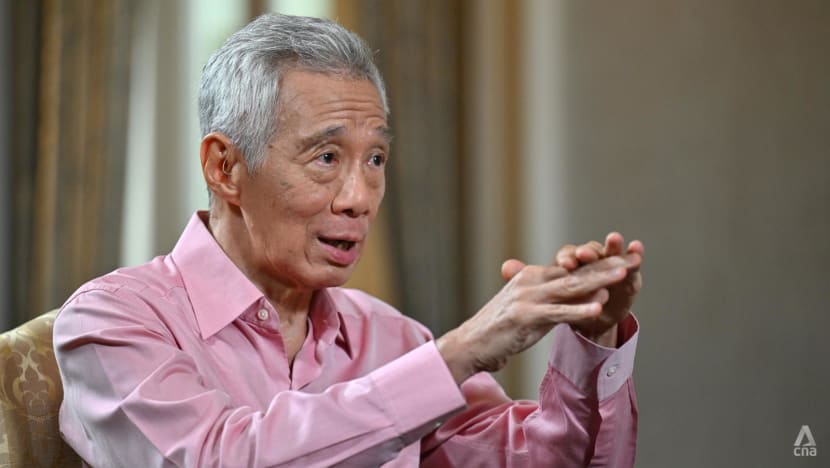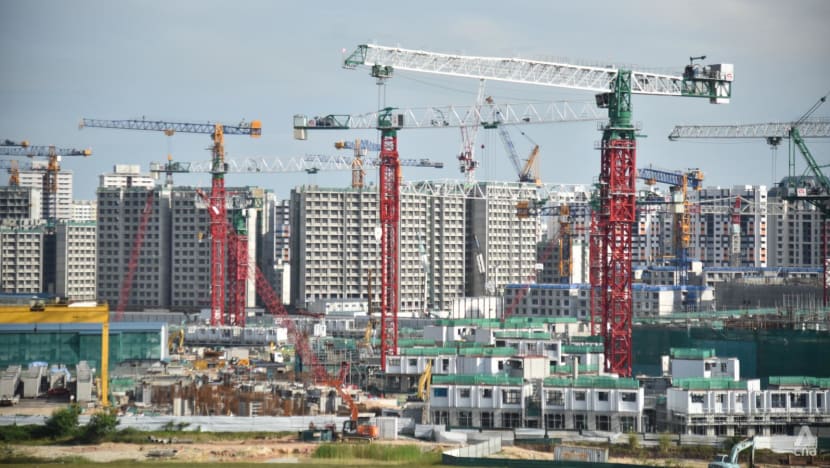Singapore has to bring in more foreign talent, but crucial to integrate them into society: PM Lee

SINGAPORE: Singapore needs to continue bringing in foreign talent to meet manpower demands, but those arriving from abroad have to be properly integrated into society here, said Prime Minister Lee Hsien Loong.
Mr Lee addressed the topic in a wide-ranging interview taking stock of his 20-year tenure as prime minister, ahead of his handover to his deputy Lawrence Wong on May 15.
In the interview, he said that managing the "inherent tensions" between wanting social cohesion and bringing in immigrants is the he "most difficult" issue he has had to deal with.
"Making people feel comfortable and not feel threatened or having social tensions build up, that is something which is going to be very difficult to manage because we do not have a lot of manoeuvring room on the downside.
"You cannot say I send off all the foreign workers, and then tomorrow we will be okay."
Singapore needs talent to stand out in the world, he said. "And you can never have enough talent.”
While the Prime Minister acknowledged that Singaporeans have reasonable concerns over the social impact of the new arrivals, he pointed out that there are jobs – such as in construction – that Singaporeans do not want.
Singapore's reliance on foreign workers in the construction sector came into the spotlight at the height of the pandemic, when a manpower crunch caused by border restrictions and COVID-19 quarantines led to delays for many housing projects.
In other sectors, more manpower is needed to perform the tasks on a larger scale – beyond the jobs that Singaporeans can fill, Mr Lee said.
“And if I can have 10 per cent or 20 per cent more engineers or technicians or healthcare workers, I can do a lot more things, I will be more productive. But I cannot take away 10 per cent of people then become 10 per cent smarter and faster just on my own.”

On the concerns that people have about foreigners – such as dilution, values and social impact – the government has to "feel our way forward and go as far as politically can be supported".
In Singapore, the city is the country – unlike other major cities such as London. So, there must be cohesion and a strong sense of value and identity, he said.
Bringing in foreigners can enrich the identity of Singapore society, said Mr Lee.
“They bring talent, they bring experience, they bring a different perspective on things. But at the same time, you dilute that, at least temporarily, because they do not have the same background.”
He gave the example of Singaporean Chinese and Singaporean Indians being different from those arriving from China and India.
Mr Lee noted that some countries’ foreign talent strategies are not viable for the Singapore context. For instance, the United Arab Emirates brings in many foreigners, while using its wealth derived from its oil reserves to cater to its resident population.
But Singapore has to bring in talent “in a controlled way” which complements local workers and professionals rather than put them out of jobs, said Mr Lee.
It also has to be done in a manner that does not dilute the country’s “social norms and mores and the way Singapore works, and cause frictions and conflict”, he added.
CHALLENGES OF INTEGRATION
Apart from ensuring Singapore has enough infrastructure for foreign workers, other factors must also be considered, such as their avenues for entertainment on weekends, he noted.
“It is partly educating the people who come here that this is Singapore, please respect Singapore norms and some things you can do in your home country, please have a care and do not do them like that here.”
It is also crucial for Singaporeans to understand the importance of bringing in foreign talents, and to make the effort to be accommodating and welcoming, said Mr Lee.
He also stressed that Singapore does not have "a lot of manoeuvring room" on this issue.
“Every now and again we have a debate in parliament, and the opposition goes - Sturm und Drang (a German term for storm and stress), ‘Why so many?’. And we say, well, do you want to cut it all off and let all the small and medium enterprises (SMEs) have no foreign worker quota? And they say, ‘No, no, no, we do not mean that, we feel for SMEs too’,” said Mr Lee.
Such a policy would affect not just employers but Singaporean workers in SMEs and multinational companies, where without the foreign worker presence, the firm would not be here, he explained.
“We have no choice but to work very hard to find ways we can have our cake and eat most of it.”
The issue of integrating foreign workers socially has been something Mr Lee has been addressing for a while.
In his 2021 National Day Rally, he touched on the topic, saying that most work pass holders and their families actually fit in quite well.
“After living here for some years, some speak Singlish, others enjoy sambal belachan and even durian!” he said then.
At that time, Mr Lee stressed that Singapore cannot give the impression it is becoming xenophobic and hostile to foreigners, as it would damage the country’s reputation as an international hub.

Citing the community of workers from India here now, Mr Lee said Singaporeans notice their influx as the numbers are “not small”.
However, they are talented individuals and are very valuable to Singapore, and "we should welcome them as we manage the flow", he added.
Mr Lee also shared that outside of India, Singapore has the biggest concentration of graduates from the Indian Institute of Technology and the Indian Institute of Management.
The two are the top institutions in India, and securing a place in one is comparable to getting into the Massachusetts Institute of Technology, Stanford University or Harvard University, he said.
Those professionals have formed associations in Singapore and hold functions from time to time. “If I can get such a pool, come here and work here, it is a tremendous plus for us.”
VALUE OLDER WORKERS
Mr Lee also acknowledged the anxieties of older workers who are concerned about their job prospects.
“Statistically, your chances of working as an old person in Singapore are very good,” he said.
For employment rates by age, the figures for workers in their 50s and going into the late 60s are high and still rising and are “good compared to many other developed economies”, said Mr Lee.
“Many people are working well into their 60s now and sometimes into their 70s, like me,” said Mr Lee, who is 72 years old this year.
“And actually, happy to have that work because it gives you something to do. It is purposeful, it is not just earning the money, but I wake up in the morning, there is something I want to do in life.”
Singapore's population is ageing rapidly. By 2030, about one in four Singaporeans will be aged 65 and above.
Mr Lee said that with the shortage of workers in the Singapore economy, older workers should be valued and tapped on.
Jobs have to be adapted so that older workers can perform those roles, while workers need to be trained as they grow older so they can take up the new openings, he said.
“They may have to change careers because the industry has changed and the old job does not exist anymore and they have to go to a reconfigured job or even change industries,” said Mr Lee.


No comments
Share your thoughts! Tell us your name and class for a gift (: